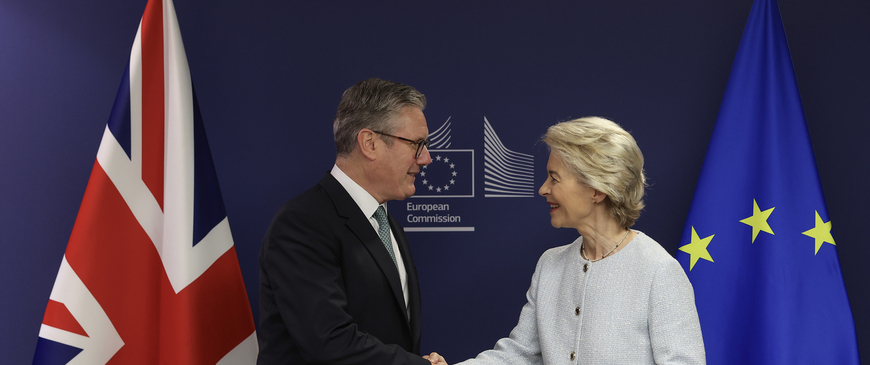
Want a ‘reset’ with the EU, PM? Here’s how you could pull it off…
With Keir Starmer in Brussels to restore post-Brexit relationships with European leaders, Ian Bond suggests ‘low-key’ is the name of the game when it comes to influencing foreign policy.
As we approach five years since Brexit, the damage to British influence in the foreign policy area is less tangible than the harm done to the UK economy. But that does not mean it is unimportant.
The Labour government is keen to improve the situation. Keir Starmer has today travelled to Brussels to make a start on “putting the Brexit years behind us” and establishing a “more pragmatic” relationship with the EU – one that, according to Downing Street, as well as tackling trade barriers, is focused on delivering a “broad-based security pact”.
It is right that when the prime minister vows to “reset” relations with Europe, he also talks about foreign policy. In this case, his approach should be modest and pragmatic rather than overambitious.
In 2012, the coalition government’s “Balance of Competences” review looked at the advantages and disadvantages of UK involvement in EU foreign policy. It summarised what a wide range of stakeholders, including other governments, think tanks and businesses told it: “The majority of the evidence we received argued that it was generally strongly in the UK’s interests to work through the EU in foreign policy.”
The UK benefited from getting 27 countries to align with UK positions and from using EU instruments to pursue shared goals. As an EU member with a global diplomatic network, a big aid programme and a permanent seat on the UN Security Council, Britain was listened to in meetings of EU ministers and officials. If the UK could persuade the rest of the EU to act in a particular crisis, then it could tap the union’s resources which were far greater than its own.
A good example was Somalia: a priority issue for the UK, which organised an international conference on it in 2012; but it was the EU, thanks in part to UK persuasion, that funded the African Union’s Amisom peacekeeping mission and trained thousands of Somali troops and coastguards.
Brexit meant no longer being part of every Brussels discussion of a foreign policy issue relevant to the UK. The Western response to Russia’s invasion of Ukraine has shown that the UK and EU can still work together: cooperation in devising and implementing sanctions has been good, and EU, UK and US sanctions envoys have undertaken joint visits to countries suspected of turning a blind eye to sanctions violations.
But UK and EU views on the conflict were broadly aligned from the start. It would be much harder now for the UK to get reluctant member states to spend money or political capital on a foreign policy issue of significance to Britain, but not to them; or to prevent the EU from taking action that the UK opposed.
Nothing can replace an EU member state’s right to attend EU meetings and make its concerns about an international situation known. However, there are ways to mitigate the damage Brexit did to the UK’s influence. Labour’s manifesto for the July election said that a Labour government would seek “an ambitious new UK-EU security pact to strengthen cooperation on the threats we face” – a reasonable aspiration.
Labour has not yet made clear, however, how it sees this working. The foreign secretary, David Lammy, has described it as covering “not just foreign and defence policy, but also economic security, climate security and a range of other foreign policy-adjacent issues”. There is a risk that the commission will read “foreign policy-adjacent” as a sign of wanting to renegotiate bits of the EU-UK Trade and Cooperation Agreement by the back door.
The sensible approach for the UK is to focus on setting up a structure of low-key, regular meetings at ministerial and official levels to discuss regional and thematic issues (such as human rights) of common concern. Where there are opportunities to act together, they should be taken. Later, there may be more scope to interpret “foreign policy” more broadly.
But after the last few years, there is still a legacy of mistrust to overcome. Modesty needs to come before ambition.
Ian Bond is the deputy director of the Centre for European Reform, an independent think-tank.
